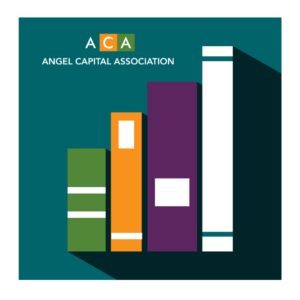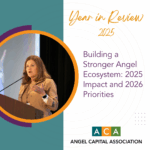Angels often make their first real impact post-investment by helping a portfolio company develop a “real” Board, by insisting on documented processes, key metrics and measures and a more rigorous approach to corporate oversight and accountability. In these ways, better governance can lead to better outcomes, particularly during periods of the earliest stages of company growth, where funding is harder to raise. As the experience of one leading angel group powerfully illustrates, the difference in returns for portfolio companies having a Central Texas Angel Network (CTAN) member on the Board was 7x higher than lacking a CTAN Board member.1 Other groups, including Boston’s Launchpad, have also confirmed the positive impact on returns from Launchpad members participating on Boards. In the latter case, returns improved by 20%.
In 2022, the typical angel group reporting AFR data had Directors for approximately 20% of the companies it funded. The median number of Director seats held by angel groups for their 2022 investments was 4.5, with an average of 5.7 Director seats. Overall, 40% of financing rounds had an angel representative of some sort (Director or Observer) at the close of the round and 70% of angel groups had at least one Board or Observer seat among their portfolios of 2022 deals. What are the implications of these data for angel groups’ role in governance and the sustainability of angel Directors over the startup journey?
Investor Organizations Writing the Largest Checks Are Preferred for Directorships
As Figure 1 suggests2, larger rather than smaller round investors are typically awarded Board seats. In return, investors providing larger amounts of capital are in a preferential position when the decision is made to award Board seats to round investors. As Figure 1 indicates, in 2022 angel groups qualifying for a Board seat invested 2x the capital compared to those groups having no Directorships. Groups granted a Board Observer seat, on the other hand, which have no governance or voting rights or fiduciary role, made no greater investment than those groups lacking any Board representation.
Groups investing at those higher levels usually required to qualify for a Board seat can become better informed, make better follow-on investing decisions and can offer a much deeper level of mentoring than investments for which the angel group is a less-involved investor.3 The added capital needed to obtain a Board seat may well be justified by the better returns Board seats can help generate.
Figure 1: 2022 Average Amount Invested and Board Representation

Source: Angel Funder’s Report Database, 2023
Angel Group Directorships Have Been Declining for the Past Four Years
Figure 2 analyzes Board Director status over the past four years across all reporting angel groups. It is concerning to note that the percentage of deals having an angel group member with a fiduciary, governance Board seat has been declining for the past several years from 35% in 2019 to 20% in 2022.
In 2022, 20% of deals had a Board Director from the reporting angel group. 17% of deals had a Board Observer (a much more passive role). In some cases, angel groups had both a Director and an Observer seat for the same company.
FIGURE 2: % of Angel Groups with Round Board Seats, 2019-2022

Source: Angel Funder’s Report Database, 2023
Directorships for angel groups in 2022 deals declined 20% from 2021 (35% of deals) and 43% (35% of deals) since 2019. This is the third consecutive yearly decline in angel Directorships.
Figure 3: Angels Are Contributing Less and Less to Financing Rounds, Limiting Their Influence

Source: Angel Funder’s Report Database, 2023
One possible reason for this decline in directorships is that the percentage of a round funded by reporting angel groups has dropped into the low 20%s of the round’s invested capital in three of the past four years, as Figure 3 indicates. Apart from the anomalous year 2021 of “funding exuberance,” angel group contributions to funding rounds have seen an ongoing decline.
When angel groups contribute less to a round, their influence on corporate governance is less since Board seats are usually reserved for the largest investors. Given the critical importance of Boards in creating good governance and protecting shareholders, this decline in influence is troubling. Among the ways to counteract this trend is greater syndication and pooling of money creating a greater pool of influence.
Board Seats Are Primarily the Result of Priced Equity Rounds
Figure 4 examines the relationship between type of round and Board representation. Two thirds of Board members were awarded seats via priced equity rounds, another 27% via convertible debt rounds. Only six percent of Board members achieved their directorships from SAFE note deals, as relatively few angel deals used SAFEs and the standard vanilla SAFEs usually exclude new round participants from governance roles. Board Observer roles were almost equally part of priced equity or convertible note deals.
Figure 4: 2022 Deal Type & Board Representation

Source: Angel Funder’s Report Database, 2023
Angels Are Most Frequently Directors During Product Development and Less Active During Business Expansion Stages
Angels are often the first “professional” investors on startup Boards. But angel Board seats can be short-lasting, particularly when follow-on round VCs impose their view of corporate governance and reallocate Board seats from founders and early angel Directors to VCs or VC Director nominees. To maintain a Board seat over multiple financing rounds, angels need to demonstrate either continued financial contributions to funding or strong, value-added contributions to the growth of the company and the mentoring of management well beyond product development.
Figure 5 examines the relationship between the stages of company growth and the continued presence of angel Board members.
Figure 5: Board Representation and Stage of Development

Source: Angel Funder’s Report Database, 2023
Key Takeaway:
- One leading angel group (CTAN) reports that Director participation increased returns 7x, another (Launchpad) by 20%.
- Board seats increase an angel group’s information and its ability to contribute to positive outcomes.
- To gain a Board seat, angel groups need to be among the larger investors in a round. On average, angel groups receiving Board seats invested twice the investment of angel groups lacking Board seats.
- Priced equity rounds are the most frequent source of angel group Board seats. Angel groups have the greatest chance of active participation in governance by financing equity rounds and the least chance by participating in SAFEs.
- To keep a Board seat as a company matures, investors need to keep adding value beyond the product development stage of startup growth.
- On the relationship between Board seats and investment outcomes, see the experience of Central Texas Angel Network, linked above: Rick Timmins, “Angel Involvement on Boards Improves Returns,” Angel Insights Blog, Angel Capital Association, July 12. 2023.
- All data in this note are drawn from the 2022 Angel Funder’s Report database (tracking CY 2022 transactions). This data insight note required additional data analysis beyond that provided in the 2022 Angel Funders Report. While conclusions are similar, the numbers differ slightly from the 2022 AFR given a specially constructed Boards of Directors data set used in this analysis.
- Launchpad also reports significantly greater returns when its members are active in other ways, including writing term sheets and leading a thorough diligence process.






